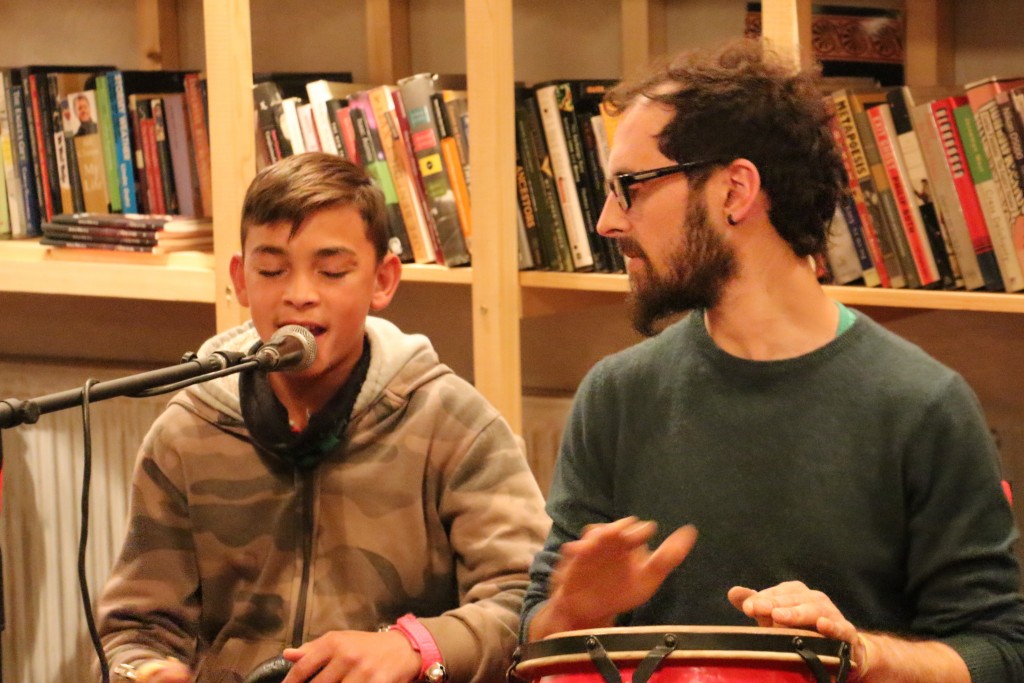

Kosovoeira, a band that mixes Brazilian capoeira and Albanian tunes, held a small concert in Pristina on March 16 at Dit e Nat. Our correspondent reports from the event.
An innovative band that fuses traditional Kosovar music with Brazilian Capoeira held their last performance at Dit e Nat on March 16th.
Kosovoeira, a project started by capoeira practitioner Luis Puchelli and Prishtina-based musician Bardhyl Salihu, brings together two very different styles of music that flourished for centuries on opposite sides of the Atlantic. The band, composed of a collective of vocal artists and instrumentalists, is currently developing an album.
Puchelli is Brazilian, while Salihu is Kosovo-born, but they have found way to incorporate capoeira into traditional Albanian music.
“Kosovo is more conservative, so it was difficult to introduce Capoeira,” says Puchelli, reminiscing about the difficulties of beginning such a project. Over the last two years the artists reached out to the community in Kosovo in order to facilitate a musical exchange and garner an interest in capoeira.
The two styles of music the band takes inspiration from rely on different themes and instruments. These merge with a stunning clarity to create a complex and intricate sound.

Albanian music played in Kosovo is described by Arber Salihu, a musician who plays with Kosovoeira, as “Eastern music” in sound and “melancholic” in theme while also being very particular stylistically. Themes vary depending on the origin of the song: some are focused on heroic epics, love ballads, wedding music, lullabies and laments.
Conversely, Brazilian Capoeira is a combination of martial arts, instruments and vocals. It was developed by African slaves in Brazil as a form of self-defense (the martial art). The musical element was meant to disguise the sounds of fighting. The berimbau is the central instrument in Capoeira music, it has a long (just under 5 feet) bow shape, with a gourd resonator near the bottom and is played with a baqueta, or long wooden stick.
For a time capoeira was illegal in Brazil and considered a divisive practice. It gradually became accepted and is today viewed as a sort of national sport which reaches far beyond Brazil, being practiced in sports clubs and universities all over the world.
One would never expect the combination to be so harmonious, says Arber Salihu. He says the unlikely marriage of Capoeira with Kosovar music in the group’s forthcoming album combines the best of both genres.
“It’s coming out quite nice, it’s working out, with the sadness that Kosovo music brings together with the delight and the sun that Capoeira music brings from the other side of the ocean.”
Kosovoeira has made one of their recorded songs available here. For more information, or to donate to the initiative, click here.
Here you can experience the event on a 360 video provided by Kallxo.com
Dit’ e Nat’KOSOVEIRA – Koncerti i fundit në 360 shkallë #Kallxo360 (#KOSOVEIRA asht nji projekt që përzinë muzikën Capoeira me elemente të muzikës Kosovare- http://ditenat.com/sq/kosoveira-koncerti-i-fundit/)
Posted by Kallxo.com on Sunday, March 20, 2016
25 March 2016 - 10:06

A political and budgetary deadlock has shut down all public transport ...

Following the ban of last year’s edition in Belgrade, the 12th editi...

The 24th edition of the ReMusica International Music Festival in Kosov...

A new movie about a rebellious teenage girl’s coming of age tells a ...